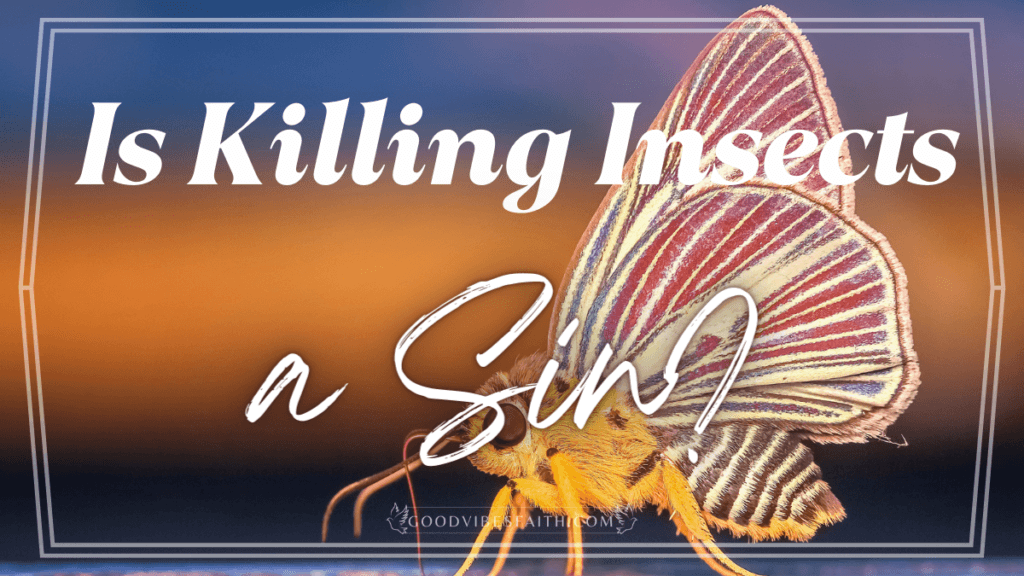Is Killing Insects A Sin? Find Out What The Bible Says

Insects are a part of life. They can be pesky, and some can even be dangerous, but they play an important role in the ecosystem. Some people believe that it is a sin to kill insects, while others don’t see anything wrong with it. So what does the Bible say about killing insects? Let’s take a look!
What does the Bible say about insects?
Insects are mentioned several times in the Bible and for different reasons.
The first mention of insects in the Bible is in Genesis when God is creating the world. He created them on the sixth day, along with the animals.
“And God said, Let us make man in our image, after our likeness: and let them have dominion over the fish of the sea, and over the fowl of the air, and over the cattle, and over all the earth, and over every creeping thing that creepeth upon the earth.” Genesis 1:26 (KJV)
This verse states ‘every creeping thing’ which would include insects. So we see that God created them and intended for them to be here.
Insects are also mentioned in relation to plagues and pestilences. In Exodus, God sends a plague of locusts to punish the Pharaohs for not letting his people go.
“If you refuse to let them go, I will bring locusts into your country tomorrow.” Exodus 10:4 (NIV)
In Leviticus 11:20-23, God gives instructions to the Israelites about which insects they are allowed to eat. Among the insects suitable for consumption are grasshoppers, locusts, and crickets.
“All the winged insects that walk on all fours are detestable to you. Yet these you may eat among all the winged insects that walk on all fours: those which have jointed legs above their feet with which to jump on the earth. These of them you may eat: the locust in its kinds, the devastating locust in its kinds, the cricket in its kinds, and the grasshopper in its kinds. But all other winged insects which are four-footed are detestable to you.” Leviticus 11:20-23 (NASB)
In Matthew 3:4, John the Baptist is described as eating locusts and wild honey.
“John’s clothes were made of camel’s hair, and he had a leather belt around his waist. His food was locusts and wild honey.” Matthew 3:4 (NIV)
Several passages in the Bible describe how God has used insects to punish people for their disobedience. For example, in Deuteronomy 7:20, God sends hornets to drive out the Canaanites.
“Indeed, the Lord your God will send the hornet against them, until those who are left and hide themselves from you perish.” Deuteronomy 7:20 (NASB)
Is it a sin to kill insects, even if they’re pests or nuisances?
Is it a sin to kill insects, even if they’re pests or nuisances? The Bible does seem to indicate that God values all life, including the life of insects. In Psalm 50:11, God says,
“I know every bird on the mountains, and all the animals of the field are mine.” Psalm 50:11 (NLT)
This suggests that God sees value in even the smallest creatures. However, the Bible also allows for self-defense, and this may extend to defense against pests or nuisances. Ultimately, whether or not it is a sin to kill insects will depend on the motivation behind the act. If it is done with malice or cruelty, then it would likely be considered a sin. However, if it is done out of necessity or for self-protection, then it may be permissible.
How can we show compassion towards insects even if we don’t like how they look?
The Bible tells us that God created everything and that even the smallest creature has a purpose. So, even though we might not like how insects look, we should show them compassion. After all, they are part of God’s creation.
One way to show compassion towards insects is to be careful when we use pesticides. We should only use them when necessary and always follow the directions carefully. Otherwise, we run the risk of harming other creatures, including birds and beneficial insects like pollinators.
Additionally, we can try to provide habitat for insects in our gardens and yards by planting native flowers and leaving some areas undeveloped. By doing this, we can help ensure that these creatures have a place to live and thrive.
Also, if we want to remove bugs from our homes, we can try to remove them without harm by using a cup and a piece of paper. This way, we can avoid killing them unnecessarily.
Lastly, we can simply take the time to appreciate these creatures – even if we don’t always like how they look!
So is it a sin to kill a bug?
The Bible does not give a definitive answer to this question. However, it does seem to suggest that God values all life, including the life of insects. Whether or not it is a sin to kill insects will depend on the motivation behind the act. If it is done with malice or cruelty, then it would likely be considered a sin.
However, if it is done out of necessity or self-defense, then it may be permissible. Ultimately, it is up to each individual to decide what they believe on this issue. However, we should always try to show compassion towards these creatures, even if we don’t always like how they look. After all, they are part of God’s creation.







